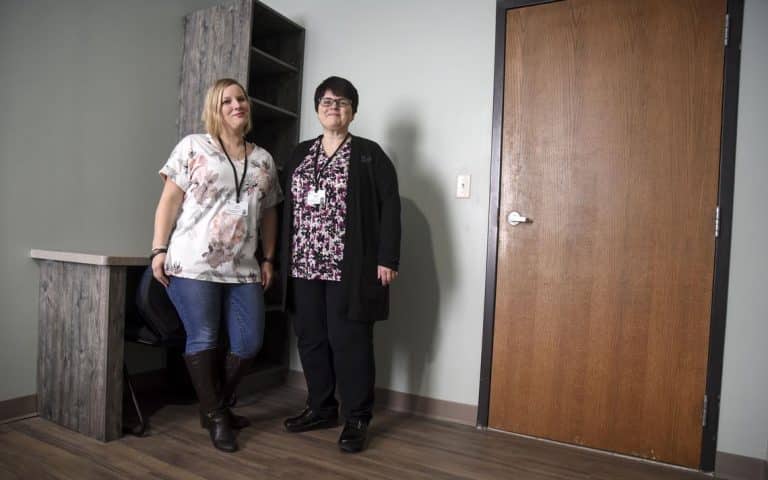WILLMAR—A long awaited renovation is nearing completion at the crisis center and detox facilities at Woodland Centers.
The changes are bringing several improvements that will increase safety and accessibility for the clients who stay there. The entire facility also is getting a facelift to make it brighter and more welcoming.
“I think it’s going to be a better atmosphere for our clients,” said Dr. Ashley Kjos, Woodland Centers executive director. “We want people to feel like they can be there and be OK. Hopefully it makes our staff feel better too.”
Earlier this year, Woodland Centers was awarded $325,000 from a pool of state funds earmarked for capital projects at regional behavioral health crisis facilities.
The improvements were long overdue, Kjos said, noting the crisis and detox units at Woodland Centers had not been upgraded since the 1970s.
“It felt dreary. It was just very outdated,” she said. “When you’re coming in for treatment, it doesn’t feel all that welcoming. It doesn’t make you want to stay.”
The crisis and detox units serve clients from the seven member counties of Woodland Centers: Big Stone, Chippewa, Kandiyohi, Lac qui Parle, Meeker, Renville and Swift. Woodland Centers also has contracts with about a dozen surrounding counties to provide crisis and detox services and gets referrals from the metro area as well. It is the only crisis center in Minnesota that takes youths, starting as young as age 8 up to age 17.
Mobile crisis services have been beefed up across the state in recent years to bring services directly to clients, both youths and adults, in need of crisis intervention. The mobile approach has helped many of these people receive quick-response care in their own community and avoid hospitalization.
But there are times when this isn’t enough, Kjos said. The crisis center functions as a halfway step between outpatient care in the community and inpatient hospitalization, she said. “People can have that support to just have a break from what’s happening in their lives.”
Stays are usually short, lasting three to five days. During that time, treatment plans are developed and group and family sessions provided to help stabilize the situation so the client can return home.
The detox unit has a similar function, providing a sub-acute setting for individuals going through intoxication or chemical use withdrawal. Here they can be monitored, undergo screening and assessment, and receive referrals for additional services.
Detox can provide care for up to six people at a time, while the crisis unit can handle up to five adults and five youths.
Technology and know-how in keeping people safe in this setting has evolved considerably over the years, and many of the upgrades reflect this, Kjos said. For example, handholds with loops have been eliminated. Bathtubs have been replaced with showers and the furniture is now bolted down. The renovation also included better sight lines for the staff to monitor clients.
While the cosmetic changes are a smaller piece of the project, they were important. Knowing that many of the clients who come through their doors are living with trauma of some kind, Woodland Centers has been focusing in the last few years on trauma-informed care that seeks to ease people’s anxiety with a more soothing and less clinical approach to the encounter—an approach that includes the physical environment.
Kjos sees the renovation as a benefit to the community and to the ability to provide detox and crisis care in a setting that’s both safe and welcoming.
“We want people to be served. This service is vital to the community,” she said. “It’s almost an urgent care. They can come in and we’ll sort it out. We take walk-ins. We’re really the place to come to.”
West Central Tribune by Anne Polta

